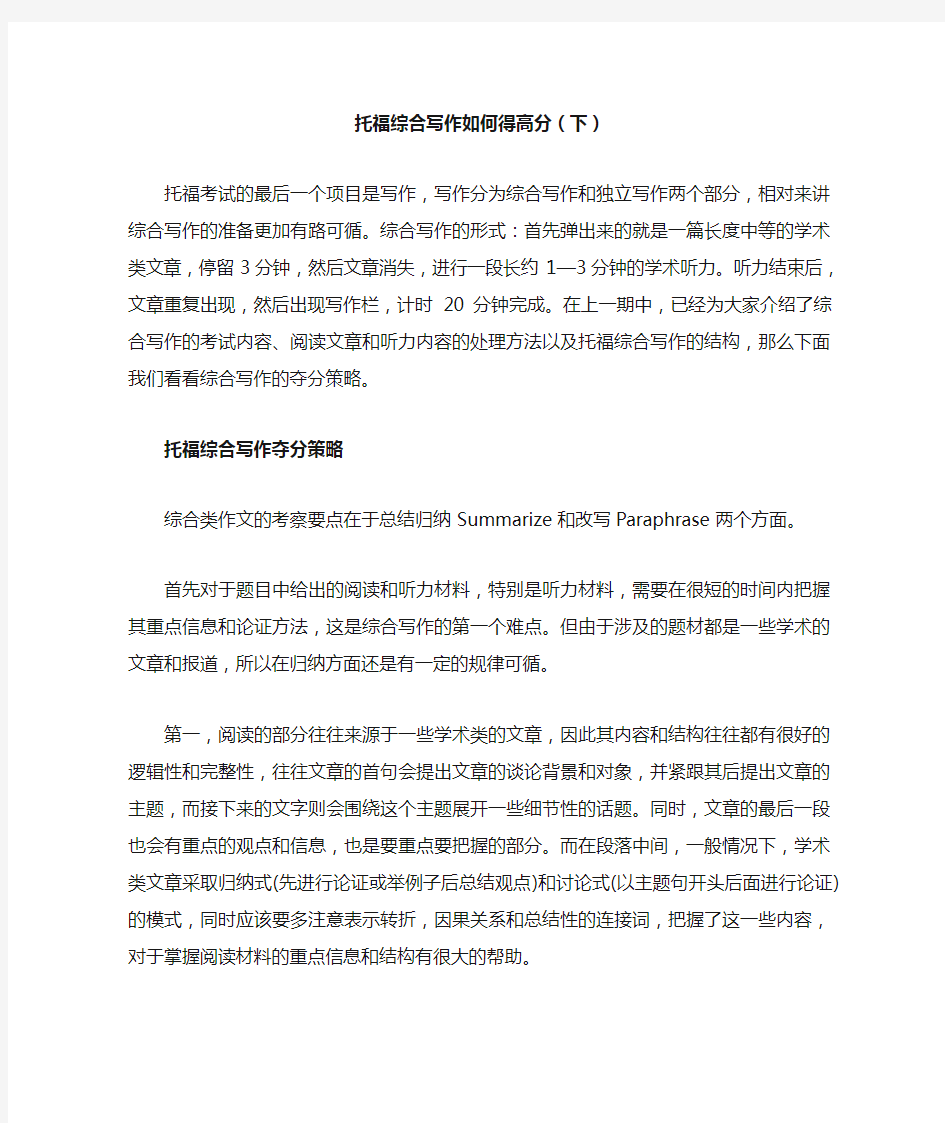托福综合写作


托福综合写作如何得高分(下)
托福考试的最后一个项目是写作,写作分为综合写作和独立写作两个部分,相对来讲综合写作的准备更加有路可循。综合写作的形式:首先弹出来的就是一篇长度中等的学术类文章,停留3分钟,然后文章消失,进行一段长约1—3分钟的学术听力。听力结束后,文章重复出现,然后出现写作栏,计时20分钟完成。在上一期中,已经为大家介绍了综合写作的考试内容、阅读文章和听力内容的处理方法以及托福综合写作的结构,那么下面我们看看综合写作的夺分策略。
托福综合写作夺分策略
综合类作文的考察要点在于总结归纳Summarize和改写Paraphrase两个方面。
首先对于题目中给出的阅读和听力材料,特别是听力材料,需要在很短的时间内把握其重点信息和论证方法,这是综合写作的第一个难点。但由于涉及的题材都是一些学术的文章和报道,所以在归纳方面还是有一定的规律可循。
第一,阅读的部分往往来源于一些学术类的文章,因此其内容和结构往往都有很好的逻辑性和完整性,往往文章的首句会提出文章的谈论背景和对象,并紧跟其后提出文章的主题,而接下来的文字则会围绕这个主题展开一些细节性的话题。同时,文章的最后一段也会有重点的观点和信息,也是要重点要把握的部分。而在段落中间,一般情况下,学术类文章采取归纳式(先进行论证或举例子后总结观点)和讨论式(以主题句开头后面进行论证)的模式,同时应该要多注意表示转折,因果关系和总结性的连接词,把握了这一些内容,对于掌握阅读材料的重点信息和结构有很大的帮助。
第二,对于听力材料,这是综合类写作过程中的难点,但在已经理解了阅读材料的基础上,对于听力材料的主题就已经有了一定的把握,因此需要将听力的重点放在判断听力文章的观点和阅读文章的观点的比较上,是互相支持还是互相对立,支持或对立的观点分别用哪些论证手段还实例来证明。但是,由于听力材料不会再次出现因此一定要在听力过程中过好笔记,记住关键性的句子和词语,为此建议平时多做相关听力资料的听取和笔记练习。
其次,Paraphrase,也就是改写。改写主要有下面的两种方法:
第一,使用不同的词汇
a.使用同义词
important→ essential, crucial, vital, significant,
think→ claim, believe, consider, deem, figure out
nowadays→ currently, at present, now, recently, in recent years, these days
b.改变词性
n. → v. &v. →n.
Eg:Marco Polo failed to mention tea or tea house…
Marco Polo’s failure of mentioning tea or tea house…
Adj. → n.
Tea was popular mainly in Southern China…
The popularity of tea….
c. 使用不同的承接词
because of → due to, owing to, because, as, since, for
but → however, nevertheless, nonetheless, whereas
so → therefore, hence, thus, consequently
d.形容词的逆向表达
Eg: not as easy as…→more difficult than…
Not uncommon→ common
The cheapest → the least expensive
第二,使用不同的句型
a. 改变词序
Eg: Marco Polo stayed for the most part in northern China ….
→Marco Polo stayed in northern China for the most part
b. 主动语态和被动语态的互相替换
Eg: Marco Polo was not found in pre-modern Chinese documents….
→Pre-modern Chinese documents did not record Marco Polo
c. 定语从句,分词和插入语的互相替换
Eg: The fact that Marco Polo was not found in pre-modern Chinese documents does not mean that he never went to China.
托福综合写作的特定表达方式
(一)转述中的指称
The writer; the author/ the passage
the speaker; the lecturer; the professor/ the lecture
THE AUTHOR: discuss; introduce; argue; conclude; suggest; recommend; propose; appeal
THE SPEAKER: 1) point out; say; tell; put; 2) disagree; disapprove; refute; rebut; reject; object to; oppose; counter; 3) doubt; question; challenge; 4) cite; mention; quote; refer to; 5) suggest; imply; put forward;6) explain; exemplify; show; illustrate
the passage is about…
the passage discusses/introduces/concludes/argues/ …
表示反对的表达补充:Contradict/ depart from/ refute/ disagree with/ oppose to the writer’s expectation/ cast doubt on/ present a (totally) different idea/ jeopardized/ this is anther part where experience contradicted theory/ differ from/ on the contrary/ this makes the explanation seem less likely/ in contrast/challenge
(二)指代文章信息的抽象名词
1. reason; cause; basis; ground; motive; motivation
2. example; instance; exemplar; paradigm
3. evidence; data; fact; proof; basis; foundation
4. explanation; account
5. definition; description; clarification
6. assumption; premise; presumption; supposition; postulation; hypothesis; guess; conjecture
7. conclusion; belief; idea; opinion; judgment; view; notion; argument; theory
8. issue; matter; topic; problem; subject; concern
9. acknowledgement; observation; prediction
10. statement; point; detail
11. advice; appeal; proposal; plan; scheme; recommendation
12. benefit; advantage; improvement;
(三)指代讲座信息的抽象名词
1. (further/closer/other) studies; researches
2. (new) finding; discovery
3. alternative explanation/theory
4. counter-example/evidence
5. allegation; claim; assertion
6. charge; objection; refutation
7. remark; comment
(四)对比、提及文章中的相关信息
1. Not as the passage puts it, …
2. Unlike described in the passage, …
3. Contrary to the passage, …/Quite the contrary, …/Quite the opposite, …/Just the
opposite, …/By contraries, …/On the contrary, …/To the Contrary, …
4. While/whereas the writer states…, the lecturer opposes the claim.
5. actually/in fact/in deed
6. The fact is …/The point is…/It turns out that…
7. 插入语: the writer thinks/deems/believes/suggests/implies/
